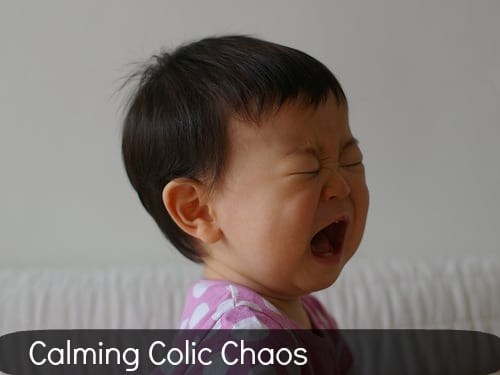Editor’s Note: Today’s guest post is from Donna Powers. After 4 years of homeopathic training, 12 years of private practice, and as many years attending seminars, Donna Powers is committed to sharing what she wishes she had known as a young parent about calming colic. Donna is a private homeopathic practitioner, a teacher to parents in her course, Vaccine Free: Now What?, and to students of homeopathy at the Western College of Homeopathic Medicine, workshop consultant, speaker, and author. Donna is on a personal mission to make sure that as many parents as she can reach know about this medical art and science called homeopathy. If you’d like to learn more about how to use homeopathy to prevent and help heal infectious illnesses, visit Donna at her website, powersofhomeopathy.com, and follow her on Facebook to stay up to date on homeopathy in the news.
By Donna Powers, Contributing Writer
When kids are sick, life gets put on hold.
But when babies have colic (“a healthy, well-fed infant who cries for more than three hours per day, for more than three days per week, for more than three weeks”), chaos gets kicked up a notch. And when nursing moms are exhausted and sleep deprived at the same time as a colicky infant? Wow…it’s the toughest gig ever! One hour of a crying, colicky infant can feel like an eternity and eventually everyone’s nerves are raw and on edge.
In Sickness and In Health
And when you are in the middle of colic, sleep deprivation, and emotional upheaval, finding another person who really understands is a gift. My own memories of postpartum depression return. In the midst of my struggles, the self-talk of feeling misunderstood and the delusion that I was alone with what was happening took over. Even my pastor at the time, unsure of what to do with a postpartum depressed mother of a colicky, never-sleeping-through-the-night child, sent me to see a Catholic nun and spiritual director. (A little different from the 19th-century colic advice: “Just put cotton in your ears and gin in your stomach!”)
Looking back now, I can see that I was ‘in a state,’ as we would observe as homeopathic practitioners. We observe without judgment – as homeopaths, we are simply there to listen, to hear what it is like to be in a state of complete and utter exhaustion. We all experience stress and exhaustion in our own ways.
And babies? They too experience the stress and exhaustion of colic in their own non-verbal, preverbal ways. Crying is just one of the many symptoms of colic, and we could all agree, colic is quite a state of being! For everyone in the household!
So from someone who has been in the vortex of the colic chaos, I am here now as a homeopath to help you find some relief for baby’s colic so everyone can return to a state calm and sleep.
Colic Signs and Symptoms: Remedies as Unique as Your Baby
Even though infants cannot talk, they sure can communicate what makes them or the colic feel better or worse during a serious crying jag. As a parent, you figure that out very quickly as well.
Some of you have learned that your baby likes to be held gently, rocked slowly, held upright with their tiny face snuggled in closely to your neck and…the window open with a slight cool breeze. Sometimes that means a slow walk outdoors in the evening where it is cool. You may also notice that the colic and crying always gets worse when you or baby gets overheated – in the car, in the house, or in the high heat of a summer day.
When your little one has colic, you’ll notice that their little abdomen is distended and hard, especially after a feed. Or you find that they are refusing to eat, but you know they are hungry and thirsty. Hiccups after eating seem funny and cute at first until you realize that this is part of the colic. You feel so badly for them. Their weeping affects you and you respond sympathetically, even though tired.
Put all those ‘signs and symptoms’ together and you have the picture of the homeopathic remedy Pulsatilla!
 image credit
image credit
By watching your baby’s preferences and their behaviors, by paying attention to what makes the colic better or worse, and noticing what makes your baby feel more settled emotionally, you are well on your way to finding a single homeopathic remedy that will bring calm and peace to the entire household. This is what we call ‘characteristic symptoms’ in the world of homeopathy. Many symptoms of colic are common — like crying, cramps, doubling in pain — but when you understand and observe your child who has colic, you can choose a homeopathic remedy that will be of most help with their individual experience of colic.
After giving homeopathic Pulsatilla, when the symptoms of Pulsatilla are similar to your baby’s symptoms, your baby will most likely fall asleep. Aaaahhhh…sweet sleep.
Final Note on Calming Colic
You know your baby best. You know what makes them feel better, what makes them feel worse. If you were to tell your doctor all the nuances of your child’s colic, they might listen respectfully, but chances are all babies would receive the same prescription. Prescription medications are meant for the common symptoms of colic. Your homeopath, though, will love to hear all the nuances and characteristic symptoms unique to your baby with colic to then find the single best homeopathic remedy.
What makes your baby’s colic better or worse? What works for you?
SaveSave
SaveSave







